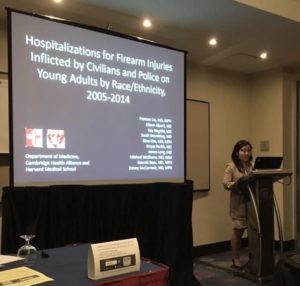June 24th, 2020
Top 10 Tips for New Interns and Residents in the COVID Era
Frances Ue, MD, MPH
The month of June is traditionally an exciting time of transition across the country. A time where we welcome a new class of bright-eyed interns, and say goodbye to our senior graduates — who have become shining stars and leaders in our communities.
This year, however, is unique, with the start of the new academic year coinciding with an international pandemic — COVID-19. New interns might be feeling especially nervous and unprepared, as in-person medical school rotations were abridged in the spring. Rising junior and senior residents, the leaders and workhorses during the surge of the sickest of the sick, are likely feeling weary and are hoping for respite and recovery.
The start of the year is also mired by uncertainty. Uncertainty about when the next surge of COVID-19 patients will occur (modelling has been done at the Harvard School of Public Health by Drs. Yonatan Grad and Caroline Buckee); uncertainty regarding in-person curriculum turned virtual; uncertainty about how to effectively build community in a virtual space. To add, strife and conflict in the world around us is targeting the core underpinnings of our society and, arguably, humanity: injustices and inequities in race and access to healthcare.
Despite all of this, there is an overwhelming feeling of hope and energy. Now more than ever, we welcome these new doctors at a historic time. Residency training provides an avenue to not only learn clinical medicine, but also to develop as advocates and leaders. As I reflect on my leadership role as Chief resident this year, I’d like to offer some thoughts on what it means to train in the COVID-era. Not surprisingly, the principles of residency training remain the same.

Using research for advocacy at the Society for General Internal Medicine during my intern year (April 2017).
To the new interns:
- Stay curious. Try to learn at least one new thing from every patient.
- Spend time with patients; their stories will rejuvenate you. Learning to efficiently and effectively complete notes and tasks will help provide space for this.
- Seek feedback and spend time to reflect on your practice. Creating a habit of regular reflection will help you build your clinical reasoning skills. Specifically, debriefing rapid responses and codes in a structured way has been shown to improve emotional well-being of providers and future patient outcomes.
- Be kind to your multidisciplinary team — e.g., nurses, respiratory therapists, medical assistants, unit secretaries, case managers. They are here for you and have a wealth of knowledge and experience.
- Take time for yourself and for things that are important to you. Do not neglect to build your physical and mental health.
- Find your community in your tribe of interns and residents. Identify mentors early on; for example, find senior residents and faculty who can help guide you.
- Lastly, be present and enjoy every moment of this experience! I have come to find truth in the adage, ‘the days are long but the years are short.’ Don’t let these moments in your formative development pass you by.
To the rising junior residents:
8. You survived and thrived during a very difficult intern year amidst a global health crisis. Take time to reflect and rest, as you transition to your role as team managers and teachers. Remember to continue to foster your own growth and learning, as you guide new interns.
To the rising senior residents:
9. Your last year is an opportunity to add the finishing touches to your portrait as a resident physician. You have gained a depth and breadth of experiences during your last 2 years of training. I challenge you to be mentors and leaders in your program. Lead by example; the interns are looking up to you.
To the graduates across the country:
10. Congratulations! You certainly deserve it. You have shown your clinical acumen and grit, all while inspiring others around you. We are so proud of how your class came together in the face of adversity and can’t wait to see all the good you will do in the world.
It has been an honor and privilege to serve as Chief resident for our residency program and hospital this past year. There have certainly been many successes matched with unexpected challenges. Throughout, I have come to reflect on the following quote on leadership:
“We must be silent before we can listen. We must listen before we can learn. We must learn before we can prepare. We must prepare before we can serve. We must serve before we can lead.” – William Arthur Ward
Do you have advice for new interns and residents? Feel free to leave a comment below or tweet at me @UeFrances.





Keep contact with other medical groups working in covid 19 hospitals to share experience.
Definitely! I found the NEJM Resident 360 Chief Chat (during Chief resident year) a great resource and meetings with Chief residents around the country occurred quite regularly throughout the year over Zoom. I also found Twitter a great resource for sharing patient observations and resources.
Thanks for reading!
Cheers,
Frances